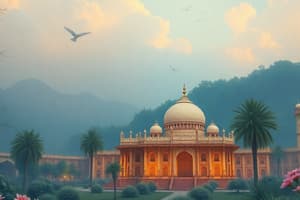Podcast
Questions and Answers
Which geographical feature contributes to India's dry conditions?
Which geographical feature contributes to India's dry conditions?
- The Thar Desert (correct)
- The Bay of Bengal
- The Himalayas
- The Western Ghats
What season in India brings heavy rainfall and is crucial for agriculture?
What season in India brings heavy rainfall and is crucial for agriculture?
- Monsoon (correct)
- Summer
- Spring
- Winter
What is the primary cause of the development of monsoons in India?
What is the primary cause of the development of monsoons in India?
- The Western Disturbances (correct)
- The Thar Desert
- The Deccan Plateau
- The Arabian Sea
During which season do the southwestern winds bring moisture-laden clouds over the Indian Ocean?
During which season do the southwestern winds bring moisture-laden clouds over the Indian Ocean?
Which geographical feature influences India's climate by bringing heavy precipitation over the northern plains?
Which geographical feature influences India's climate by bringing heavy precipitation over the northern plains?
During which season do floods often occur in India?
During which season do floods often occur in India?
What creates localized microclimates along the western and eastern coasts of India?
What creates localized microclimates along the western and eastern coasts of India?
What weather pattern characterizes India's coastal areas throughout the year?
What weather pattern characterizes India's coastal areas throughout the year?
What is a common extreme weather event that threatens coastal communities in India?
What is a common extreme weather event that threatens coastal communities in India?
Where do heat waves commonly occur in India?
Where do heat waves commonly occur in India?
What type of temperatures are typically experienced in India during summer and winter?
What type of temperatures are typically experienced in India during summer and winter?
What is the average annual temperature range in India?
What is the average annual temperature range in India?
Flashcards are hidden until you start studying
Study Notes
Climate of India
India is located in South Asia and has a diverse climate due to its vast size and varied topography. It experiences three main seasons: summer, monsoon, and winter. The country's climate is influenced by the Himalayas in the north, the Thar Desert in the northwest, the Arabian Sea to the west, and the Bay of Bengal to the east.
Monsoon Season
The monsoon season in India lasts from June to September and brings heavy rainfall to most parts of the country. This season is crucial for agriculture because it provides water for crops. During this period, the southwestern winds bring moisture-laden clouds over the Indian Ocean, which then move northeastward towards the Himalayan mountain ranges. The collision between the moist air masses and the mountains causes heavy precipitation over the northern plains, Central India, and peninsular regions.
Weather Patterns
India's weather patterns vary significantly across different regions. In general, the country experiences hot summers and mild winters. However, there are several unique regional climates. For example, the coastal areas have high humidity levels year-round, while the interior regions experience arid temperatures. Additionally, the presence of the Western Ghats in the western coast and the Eastern Ghats along the eastern coast creates localized microclimates within these regions.
Temperature Variations
Temperature variations in India are significant, with extreme differences between northern and southern regions. Northern India experiences colder winters and hotter summers, while southern India has more moderate temperatures throughout the year. The average annual temperature range is approximately 15°C, with higher temperatures in the desert regions and lower temperatures near the Himalayas.
Geographical Influences
Geography plays a significant role in shaping India's climate. The Himalayas create natural barriers, causing the Western Disturbances to collide with the Western Ghats, leading to the development of the monsoons. Additionally, the Deccan Plateau and the Thar Desert contribute to India's dry conditions. The Arabian Sea and the Bay of Bengal also influence India's climate through their impact on the strength and direction of the monsoon winds.
Extreme Weather Events
India experiences various extreme weather events, including heat waves, floods, droughts, cyclones, and thunderstorms. Heat waves occur during the summer months, particularly in the northern regions, where temperatures can exceed 45°C. Floods often occur during the monsoon season due to excessive rainfall, especially in areas like Bihar, West Bengal, Assam, Orissa, Madhya Pradesh, Maharashtra, Gujarat, and Karnataka. Droughts can occur when the monsoons fail or are weakened, affecting agricultural productivity in affected regions. Cyclones primarily occur along the eastern and northeastern coasts, threatening coastal communities. Lastly, thunderstorms are common during the post-monsoon season and can cause severe damage to infrastructure.
Studying That Suits You
Use AI to generate personalized quizzes and flashcards to suit your learning preferences.




